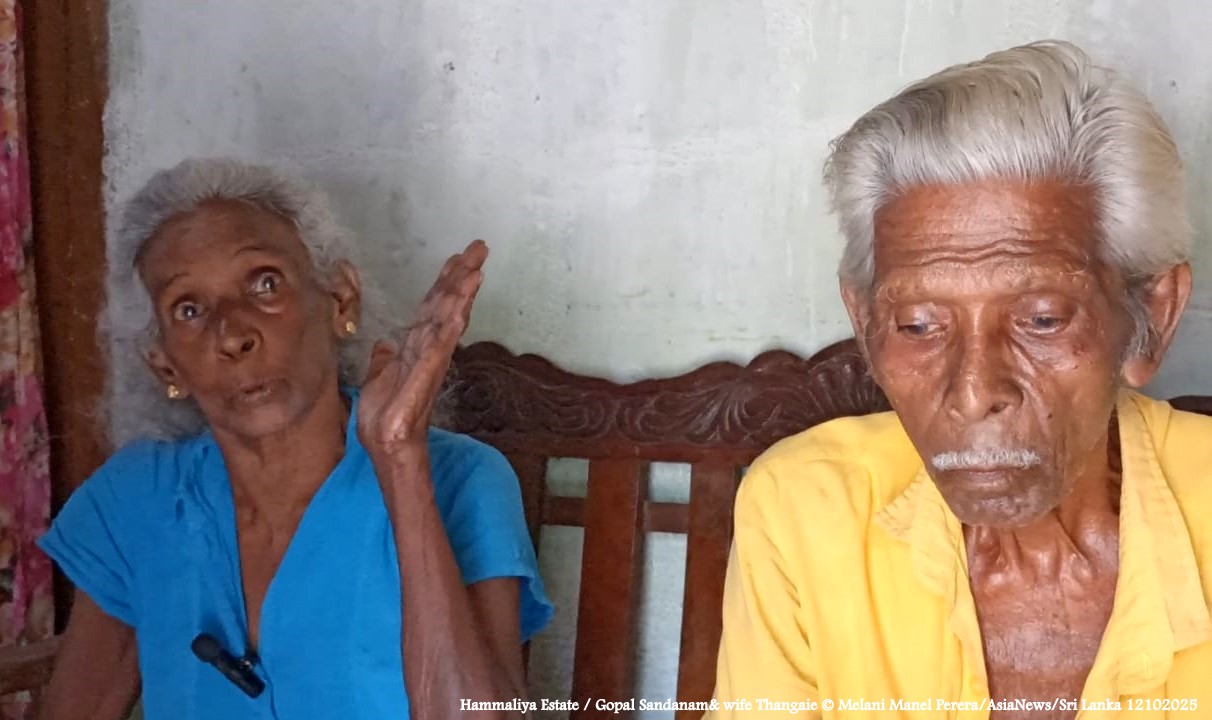Nine families face eviction from plantation after 80 years of work
Originally from southern India, the ethnic Malaiyaha Makkal families, risk losing their home. "We have nowhere to go,” they told AsiaNews. After decades of working without social security protections, the new owner, a resident of the United States, announced the sale of the land and ordered the residents to leave within three months. For the NGO Voice of Plantation People, it is a question of humanity.
Galle (AsiaNews) – Nine Malaiyaha Makkal families, ethnic Tamils originally from southern India, are left in Hammeliyawatte, an estate in Baddegama Division (Galle District). Some 20 families lived at the site in 1945, their lives dedicated to developing the estate.
Since 2023, they have been unemployed, and three months ago, they were asked to leave after serving the estate for 80 years. They question whether the eviction is fair.
Also known as Wilegodawatte, Hammeliyawatte (or Hammeliya estate) once grew tea and rubber, but switched to cinnamon. The property covered approximately 77 acres worked by some 20 families, housed in two rows of 16-room line houses, which are currently in a state of disrepair. A small plot was set aside as a burial ground for the estate's residents.
The owner of the estate, Jayantha Samarasinghe, sold the estate in separate parts, keeping six acres to grow cinnamon. After he passed away in 2002, his wife, a teacher and principal in a local Sinhalese language school, began running the estate. Eventually, the daughter, Sasanka Samarasinghe, a medical doctor living in the United States, took over.
After several years of silence, the current owner suddenly called Sandanam Walliamma, 58, the eldest daughter of the oldest working family still living on the estate, to inform her that she had arrived in Sri Lanka and needed to meet the workers immediately.
On 5 July Mrs. Sasanka, who was at her bungalow along with three other men and a woman, met Walliamma and the other families..
“My mother is old now and cannot look after the estate, so we are going to sell. You are being given three months to find a place,” Sasanka Samarasinghe told Hammeliyawatte residents who were shocked.
“What are we going to do? The children are still going to school. We have the vote here. We are registered for everything at the estate. So where can we go?" Sandanam Walliamma replied.
Sasanka Samarasinghe replied that it was none of her family's business, noting that they could not sell the land as long as they were there.
“We have been given a three-month notice on compassionate ground. After you leave here, we will open a bank account for each family with Rs. two lakhs (200,000 rupees) and credit it. Since you are also earning money now, add the remaining money and build a good house,” Sasanka Samarasinghe said.
For two of the oldest male estate employees who still live on the estate, such a statement is intolerable after 80 years and five generations. In their view, a fair solution to this problem is needed.
"Even if Ms Sasanka says to leave, we have nowhere to go. Where should we go?” they told AsiaNews. “We need to have nine houses built by her somewhere else, and settle there," said 82-year-old Palaniwelu, and 80-year-old Gopal Sandanam, speaking to AsiaNews.
The nine families number 25 people, children included. One of them, a young woman, is a graduate in international studies, psychology, and political science.
Despite severe economic hardship and challenges, she somehow managed to study, and she hopes that her younger siblings on the estate can still receive a good education.
She spoke to AsiaNews about the unexpected eviction attempt. “My parents were born in this estate, and my grandparents were all born in this estate. [. . .] Where will we go? Since 2023 our parents have lived doing day-to-day jobs”.
According to Voice of Plantation People, an organisation helping estate residents deal with this difficult situation, this initiative is very unfair.
“When planning the sale of the estate, the owner could have separated the land where these nine families are living. That’s not a large number, nine families. That would have been the humane thing to do,” VOPP Executive Director Anthony Jesudasan told AsiaNews
What is more, none of the workers – four generations of Hammeliya estate residents – were provided with any documentation relating to their employment, and no one received information about their mandatory tax contributions to the Employers Provident Fund (EPF) and the Employers Trust Fund (ETF), even though some worked on the estate for more than 60 years.
The estate workers were not paid in cash, but received vouchers from the owner to purchase dry rations at a nearby shop.
The workers recall that around 2007, they were paid around 500 rupees (about US$ 1.5) a day for growing, processing, and harvesting cinnamon. By 2023, the daily wage had increased to around 1,500 rupees.
Although the workers contributed their labour to the estate for decades, the estate management has failed to guarantee their legal right to social security and pension benefits, the advocacy group said.
05/04/2023 13:50
22/03/2022 12:15







.png)










